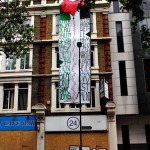On Monday June 18th Palestine Place closed it’s doors after two busy weeks of workshops, cultural events and demonstrations in support of Palestinian liberation. A diverse range of people, many from outside the already active Palestine movement, had come together to transform one of London’s many abandoned buildings into a radical space for organising around the Palestinian struggle, opening on June 2nd.
The two weeks were packed with events, many attended by a large number of people who were becoming exposed to political organisation for  the first time. Highlights included a Skype link up with Palestinian hunger striker Khader Adnan, who described the space as a “pioneering idea” and urged participants to show solidarity with fellow hunger striker Mahmoud Sarsak.
the first time. Highlights included a Skype link up with Palestinian hunger striker Khader Adnan, who described the space as a “pioneering idea” and urged participants to show solidarity with fellow hunger striker Mahmoud Sarsak.
Cultural events included performances from Reem Kelani, lessons in the Arabic language and an electrifying final night show headlined by Raast.
Prominent academics such as Garda Karmi and Ilan Pape ran events within the space, as well as a wide variety of activist groups, including ISM London, both from within the Palestine movement and from outside. No Borders and UK Uncut used the space for organising, and other non-Palestine related groups such as the Travellers Solidarity Network and Global Women’s Strike ran events; building links between movements that will be essential to maintain if we are to successfully challenge the global issues that bind so many struggles, Palestine included, together.
Joint struggle was on full show during a lively demonstration outside the G4S annual general meeting on the first Wednesday after the space opened. Â The anti-deportations and Palestine movements have formed a coalition in recent months against the Anglo-Danish company, responsible for abuse of migrants here in Britain, and Palestinian prisoners in the Israeli jails they run. Palestine Place was used as one organising base for the demonstration, which was noisy, colourful, large and effective. The space was later used as a base for organising demonstrations and nightly vigils calling for the release of Mahmoud Sarsak.
It remains to be seen what lasting impact the project will have, but it certainly demonstrated a new way of organising around Palestine and the mood of those involved, buoyed by the news of Mahmoud Sarsaks imminent release, remains optimistic. What is certain is that the Palestinian Solidarity movement now has new energy, new alliances, and a new direction to push on for the future.
